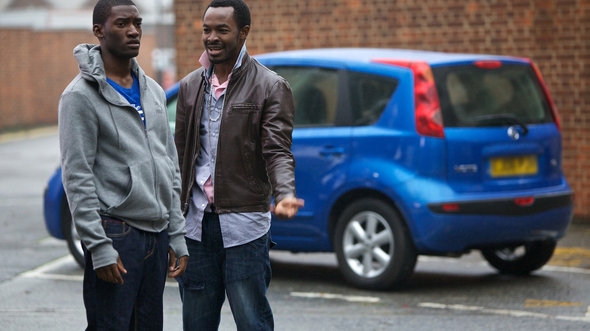
Director: Destiny Ekaragha
Writer: Bola Agbaje
Starring: Malachi Kirby, O.C. Ukeje, Michael Maris, Shanika
Warren-Markland, Adelayo Adedayo
Synopsis: Once his visa is approved Iku (O.C. Ukeje) comes to
London to join his family. His brother Yemi (Kirby) has to show him around and
get to know him, but each second with Iku drives Yemi mad.
Gone Too Far’s Peckham-based comedy is anything but humorous. For
people living in the area, or similar estates, those with Nigerian family, or
fans of simplistic formulas the film will entertain. Nevertheless, judging it
from one perspective sees it as a horrific tale of violence, racism and “broken
Britain”.
Having won an Olivier award for
the play of the same, you’d imagine there to be a lot of heart and depth to
this tale of conflicting cultures. Writer Bola Agbaje once said she’d written
the play for her parents, a telling problem for the film – shown to a certain
audience this would mean something, but most will view it as off-key and bland.
We follow Yemi, a selfish teenager
who has to look after his brother after his arrival from Nigeria. As the two
brothers head out on an errand for their mother things start to go awry. Almost
structured like a Peckham-based Baby’s
Day Out featuring an out-of-towner Nigerian instead of a toddler, Gone Too Far is beyond predictable.
Certain characters come and go without warning, but the six main characters
have unmistakably conventional paths to follow. Formulaic as it is, it doesn’t
take away from the fact that there are only two pleasant characters out of the
six, making it a taxing viewing experience.
The film shows a comic side to
street thugs who are anything but likeable. The notion that any person willing
to kill someone (be it the action or a mere threat) could be funny is
perplexing. Whilst these characters are not the focus, they are granted a lot
of screen-time. Another character called Armani (the self-obsessed, dolled up
love interest), given an important strand of the storyline, is yet another
figure scratching away at your sense of sanity. Each time she’s on screen you
await her comeuppance; the fact that she gets off lightly may be true to life,
but in relation to the other positive resolutions, it’s a tough pill to
swallow.
The overall message that people
are too narrow-minded and often ignorant of each other’s cultures is
strengthened at the end, but not before an hour of confused preaching. The
jokes aimed at Iku for having an odd fashion taste is inherently childish.
What’s more, the two thugs characters who enjoy smoking weed, stealing, and
beating others up are occasionally presented as funny – incorrect. It’s
distressing to see these sort of people treated in a forgiving light when they
are part of problem with this country. If the film manages to discredit their
place in this country, then it’s working on some level.
Puerile in its characterisation, Gone Too Far is a hopeless satire on the
state of country. It adds to the sub-genre of British cinema focused on council
estates, injected with a paradoxically quirky tone, too low-brow and lacking.
For some this film will seem profound and entertaining; with the right audience
it’ll work. Nevertheless, on the whole, it’s a disheartening look at our
developing culture.
*
Also posted on LiveForFilms
No comments:
Post a Comment